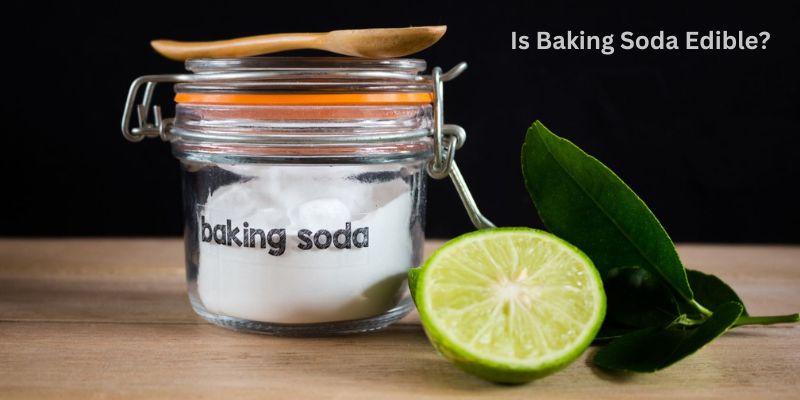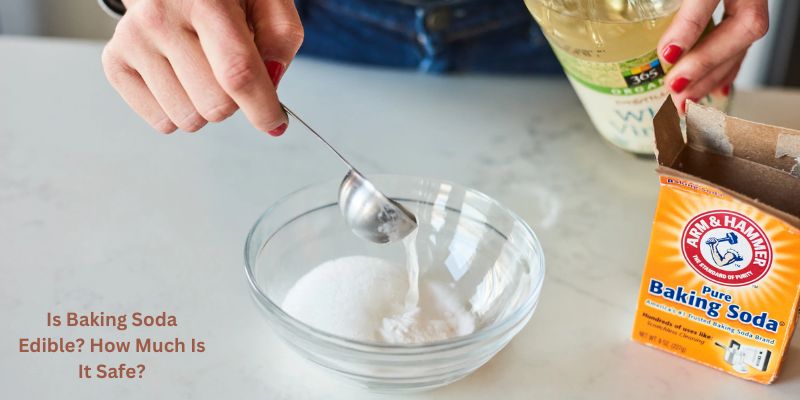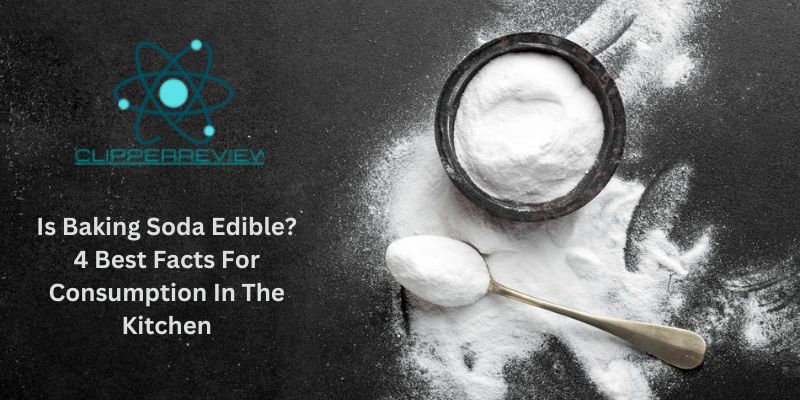Soda Benefits
Is Baking Soda Edible? 4 Best Facts For Consumption In The Kitchen
Is baking soda edible? Baking soda has been a staple in many households for decades, known for its versatile uses in cleaning, deodorizing, and even cooking. But when it comes to its edibility, the debate has been ongoing. Some argue that baking soda is safe to consume in small amounts, while others believe it should strictly be used for non-edible purposes. In this blog, sodafountainofvenice.com will delve into the various perspectives surrounding the consumption of baking soda and explore the potential risks and benefits associated with its use in the kitchen. So, grab a cup of tea and join us as we uncover the truth about baking soda’s edibility.
1. Is Baking Soda Edible?

Is baking soda edible? Yes, baking soda may be consumed, and it has been used in a variety of dishes for ages. A light, fluffy texture is produced in baked goods by the reaction of an alkaline powder called baking soda with an acidic component like buttermilk or yogurt. In addition, it works well as a leavening agent to aid in the rise of baked goods including cookies, cakes, and other sweets.
It’s crucial to keep in mind nevertheless that excessive use of baking soda might lead to digestive problems as well as upset stomachs. Always carefully read the directions before using baking soda in any recipe to guarantee its safe intake. In order to maintain the effectiveness and quality of your baking soda, be sure you store it in an airtight container that is not near any sources of moisture.
It’s not surprising that baking soda is such a commonly used cleaning product all around the world given its many use in the home and in recipes. So why not try it out? To find out how you may utilize this natural and inexpensive commodity to simplify your life, start experimenting with baking soda right away.
If you are interested in similar topics, you can also refer to Does Baking Soda Kill Fleas?
2. Is Baking Soda Edible If It’s Uncooked?

Now that you know the real answer to the issue, “Is baking soda edible,” it’s time to address, “Is baking soda edible raw?”
No, that’s not the solution to this query. Raw baking soda has major health concerns and can even be poisonous, thus it should never be taken. Baking soda consumption can cause the body to become too alkaline, which can cause symptoms such as nausea, vomiting, stomach discomfort, and disorientation.
Poisoning: Excessive consumption of baking soda can cause poisoning and harm to the stomach and digestive system. Symptoms from these issues might include nausea, diarrhea, and increased flatulence. As the body pumps water into the stomach to dilute the salt level, these signs and symptoms manifest.
Vomiting and nausea are additional negative effects of using a much of baking soda. This is due to the fact that baking soda can disturb the body’s normal pH balance when consumed in high quantities, resulting in these unpleasant sensations.
stomach discomfort: If you consume too much baking soda, you may get stomach pain. This is because the elevated alkaline in your stomach will irritate your stomach lining, resulting in pain and discomfort.
Baking soda obviously has numerous purposes in the kitchen and around the house, but if used improperly, it may also be harmful to your health and welfare. Before considering whether baking soda is suitable for you, be sure you are aware of the risks!
Therefore, baking soda should never be consumed in its unprocessed state and should always be used with caution. Baking soda should also be kept out of the humidity in an airtight container to preserve its freshness and effectiveness for extended periods of time.
3. Is Baking Soda Edible? How Much Is It Safe?

Even while baking soda is easily accessible as a home cure, the dosage shouldn’t go over a particular point. Always follow the dosage instructions before consuming.
According to studies, consuming too much baking soda might be harmful. Overconsumption may result in nausea and diarrhea, and continued usage may harm the heart due to the high salt content.
4. Is Baking Soda Edible? What Safety Advice Should I Follow When Using Baking Soda
When using baking soda, wear safety goggles and gloves: Alkaline baking soda is a powder that can irritate the skin and eyes.
Ventilate the area where you are working. Baking soda releases a potent odor when it comes into touch with acids or other chemicals, so make sure there is plenty of fresh air flowing through the space.
Verify the expiration date: To guarantee best efficacy, baking soda should be used within a year of the date of purchase. Any baking soda that has reached its expiry date should be discarded.
Keep baking soda and other chemicals separate: Baking soda may produce hazardous fumes when combined with other substances like vinegar or bleach, which if inhaled can irritate your lungs or harm your respiratory system.
Take care to adhere to the directions: Before using baking soda in any activity or recipe, make sure you follow the directions on the container.
You can make sure that baking soda is used safely and successfully for all of your cleaning requirements by adhering to these safety guidelines.
Conclusion
In conclusion, Is baking soda edible? Yes, but it is important to use it in moderation and as directed. While it is commonly used as a cooking and baking ingredient, it should not be consumed in excessive amounts due to its high sodium content. Baking soda can also have potential health benefits when used appropriately, such as aiding digestion and relieving heartburn. However, it is always recommended to consult a healthcare professional before using it for medicinal purposes. Overall, baking soda can be a versatile and useful ingredient in the kitchen, but it is essential to practice moderation and follow proper guidelines for its consumption.


